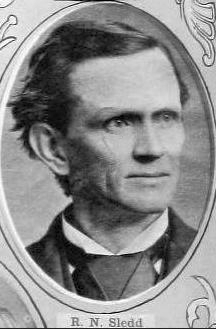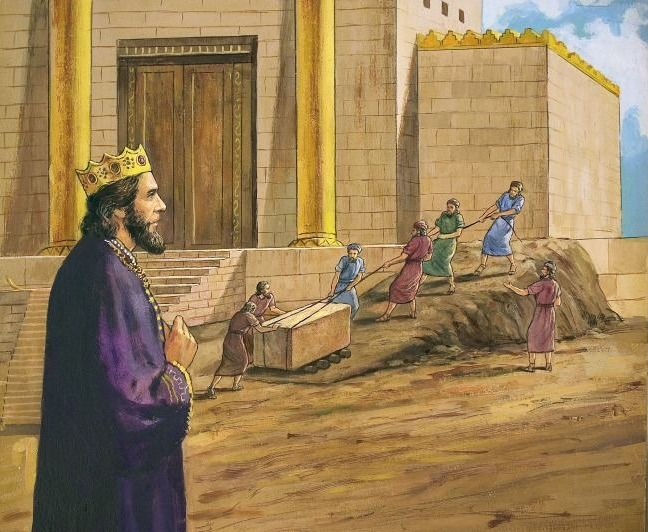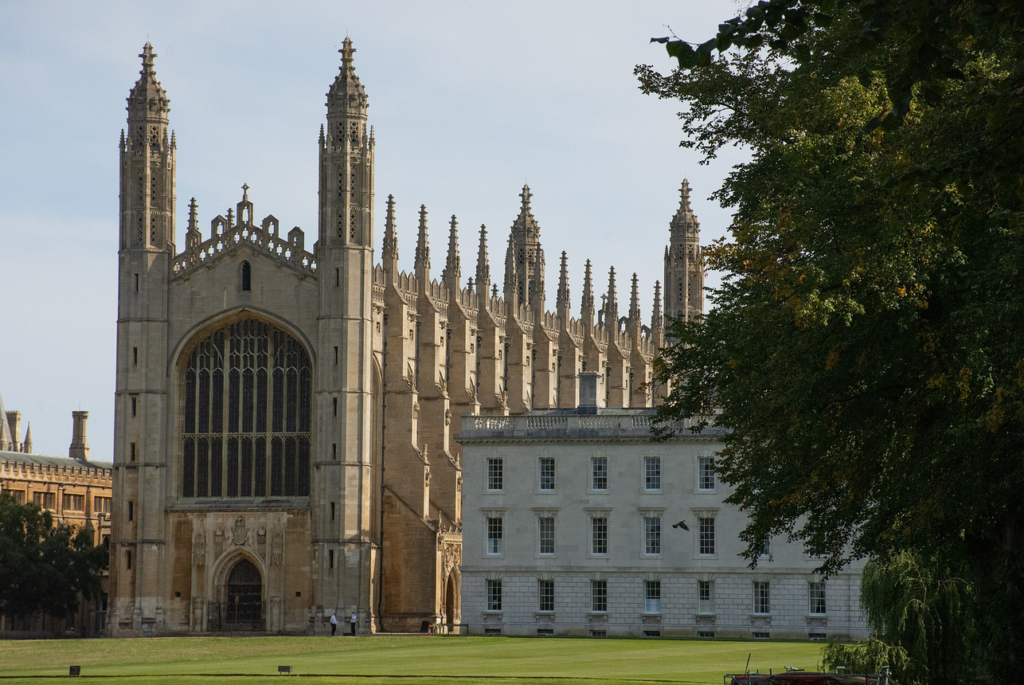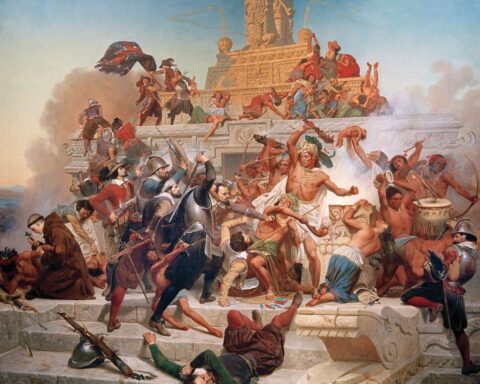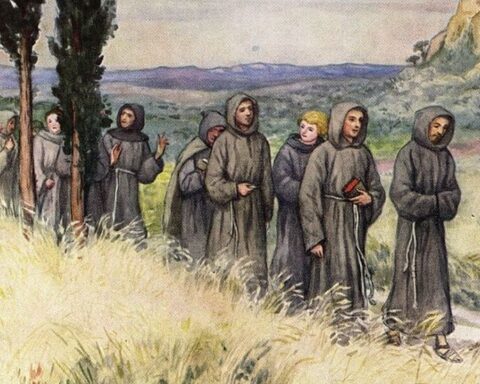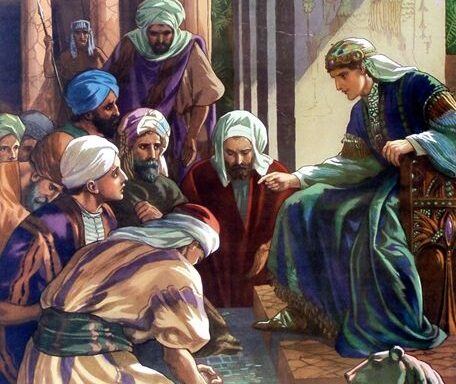Editor’s note: The following address, delivered at the Commencement of Trinity College, Durham, N.C, June, 1894, is extracted from True Heroism and Other Sermons, by R. N. Sledd (published 1899).
“Take heed now; for the Lord hath chosen thee to build a house for the sanctuary: be strong and do it.” — I Chron. xxviii, 10.
One of the cherished projects of David, in the closing years of his life, was the building of a house for God in Jerusalem. This was a measure of both piety and policy; of piety, inasmuch as it would give tangible and enduring expression to his faith in God and his devotion to Him; and of policy, inasmuch as it would naturally endear the city to the people, attract them to it, increase its commerce, and thus enrich and strengthen his capital.
But David had been a man of war from his youth. His hands had been stained with the blood of his fellow men. On this account he was adjudged an unsuitable instrument for the proposed service. But he was permitted to contribute largely to its success by awakening an interest in it among his people, by gathering immense stores of necessary material, and by devoting to it a liberal share of his private fortune. He was also assured that his house should have the honor of this great enterprise — that Solomon, his son, should succeed him on the throne, and that he would be specially endowed for the work, and would prosecute it to a successful issue.
David was now well stricken in years and was conscious that the time of his departure was at hand. That there might be no dissensions after his death with respect to the succession, he directed that Solomon should be anointed and proclaimed king; and for a short time father and son reigned jointly. As the end drew nigh he called together the elders and dignitaries of the realm, and after a tender and faithful address to them, gave his final charge to Solomon in these words: “And thou, Solomon, my son, know thou the God of thy father, and serve Him with a perfect heart and with a willing mind; for the Lord searcheth all hearts, and understandeth all the imaginations of the thoughts; if thou seek Him, He will be found of thee; but if thou forsake Him, He will cast thee off forever. Take heed now; for the Lord hath chosen thee to build a house for the sanctuary; be strong and do it.”
Happy had it been for Solomon had he never forgotten this paternal counsel. But alas! in his later years he turned aside after strange gods. History does not follow him into the darkness, nor record his return to the light. The charity that “hopeth all things” cannot lift the shadow of sad uncertainty that rests upon his end.
The statement of the text, “The Lord hath chosen thee to build a house for the sanctuary,” is an interesting and suggestive one. God had a place to be filled, and a work to be done, and he raised up Solomon for the special purpose of filling that place and doing that work. This particular statement suggests this general truth: In His great system God has a place and a specific work for each individual; and the individual is as truly chosen of God to fill that place and do that work as Solomon was to wear the crown of David and build the Temple on Mount Zion.
We cannot suppose that God has created anything without intelligent design. He does nothing capriciously or at random. He has not created simply because He can create, or simply for the pleasure of creating. But He had an infinite variety of places to be filled, and of subordinate ends to be accomplished in order to the completeness and glory of His work and the achievement of the final end of His administration; and every movement of His creative energy has looked to the filling of those places and the working out of those subordinate ends. Its productions are endlessly varied; but there is no surplusage — nothing for which God has no use. The trees of the forest and the flowers of the field, reptiles and fishes, insects, birds and beasts, sun, moon and stars, angels and men, each and all were ordained to meet specific ends and perform specific functions in the divine economy. What those specific functions are in many cases we are wholly unable to decide; but we can no more deny the fact than we can question the divine wisdom.
And if it be a fact, then it follows that no creature can fill the place and do the work of any other creature. There may be, doubtless are, certain compensatory arrangements whereby defects and failures may be remedied. But such arrangements do not affect the general truth that every creature must stand in its own lot. Every atom must fill its own place, every sun do its own shining, every flower its own blooming, every bird sing its own song: otherwise the divine order in creation is to that extent disturbed.
It is therefore no part of God’s plan that any two men should occupy the same place at the same time and undertake the absurdity of doing simultaneously precisely the same thing. Their places and work may be, in many respects, similar, but never identical. “To every man his work,” is the divine order — his own work, so peculiarly his own that no being in the universe can do it for him. It is the violation of this order, the failure of angels and men to stand in their allotted places and do their appointed work, that has occasioned all the evils that afflict the universe. It was to restore and maintain this order that God introduced the expedient of the cross. With its light to guide us we may find our appropriate place, and with its grace to help us we may do all His will concerning us.
The special work of Solomon was the building of a house for God. That which he was appointed to do in a literal and material sense, every man is called to do in a moral and spiritual sense. Men have different orders of talent and different degrees of cultivation; they pursue different callings and occupy different stations in life. But whatever differences there may be in these and other respects, they all agree in this, that every one is a builder; not always consciously, yet constantly and of necessity a builder. Every day, every hour, whether he will or not, he is building — laying the foundations, rearing the walls, setting up the columns, and pushing to completion a structure that shall endure forever. That structure is his own character, that which he is in himself, the reality of his being as distinguished from all that is merely outward and formal. Intellect, natural and moral sensibility, and will are the grand forces at work on this structure. In the quality of their work, in the moral tone of the thinking, feeling, choosing, and by consequence of action, we reach the central fact of character as virtuous or vicious, pure or impure. As we cannot determine the quality of the flower from its beauty, nor of the fruit from the delicate blush on its cheek, so the truth with respect to character cannot be determined by appearances, but only by ascertaining the moral quality of the motives and intents of the heart — that subtle force that lies back of our powers and gives them vitality and sustains their activity, and out of which, says Inspiration, “are the issues of life.” “As a man thinketh in his heart so is he.” Impure thinking, and impure feeling, generating as they must impure motives to action, can produce only an impure character. We may as reasonably expect to build a beautiful and substantial house of rotted timbers as to build up a good character with a bad heart.
As Solomon’s mission was to build a house for God, so it is our high calling to build ourselves up into “an habitation of God through the Spirit.” In the human body there are vital forces which, when in healthful exercise, appropriate the food, and drink, and air, and gathering out of these the elements suited to its nutrition, by a wonderfully delicate, yet powerful machinery, convey them to all parts of the organism, replenishing its waste, strengthening its weak points, and imperceptibly, yet constantly adding to its stature until the measure of completed manhood is attained. So in the human soul there are forces which are ever reaching out, seeking, grasping, appropriating such elements as the moral world may supply. Unhappily in this matter of nutrition and growth the body is wiser than the soul. It will ordinarily reject what is baneful; while the soul will seize upon poisonous error and feed with greediness on the most noxious forms of corruption. The result is growth, the formation of a character, but a character blotched and deformed by the poisons on which it has fed. Our work is to guide these forces of the soul in their search for food, and supply only that which is pure and healthful that we may grow into “an holy temple in the Lord.”
It is of first importance that we realize that this is our personal work — that it is in our hands, under our control, and that we alone are responsible for the issue. Underlying all good character and right living, and essential to it, is the distinct, ever-present, controlling sense of personal moral obligation. To the consistent fatalist good character is impossible. According to his creed, there is no virtue, no vice; all is of inexorable and eternal necessity. Equally impossible is it for the man whose views of his responsibility are indistinct and fitful to have a strong and well developed moral character. Our virtue can be only in proportion to our knowledge of duty and our voluntary performance of it. Though we may do that which is right, unless we know it to be right and do it because it is right, our act is not only with out virtue, but may be criminal. Nor is it possible for the man who understands his duty to do it virtuously if his conscience be so seared and his heart so sensual and gross that he does not always feel the force of obligation. There must be then right views of truth and duty and right feeling towards them; then follows naturally right action. If all or either of these elements be wanting, our sense of personal responsibility is necessarily defective and to that extent our hands are weakened, our work undone and our character distorted.
An all important part of the work of Christian parents and educators is to awaken and develop in the young this sense of individual responsibility. Much is to be done in the way of supplying mental stimulus and proper moral aliment, in correcting the perversions of sensibility, remedying the defects of a feeble will, and giving a right direction to the impulses and aspirations of the soul. But all this will avail but little towards the formation of a strong and beautiful character unless the moral sense be quickened into vigorous life, and the child or youth be deeply imbued with the conviction that, whatever others may do for him, he is the builder of his own character, and thus the arbiter of his own destiny.
Happily for us in a matter of such moment we are not left to work at random, or to follow the suggestions of our own hearts, the unsteady light of human philosophy, or the imperfect examples of human history. As God gave by the Spirit the plan and specifications of His house in Jerusalem, so He has given us a model and written out the specifications after which we are to build. That model is His incarnate Son and those specifications are the precepts of His holy word. It is true that we are exhorted to be “followers of those who through faith and patience have inherited the promises,” and many examples of men of lofty integrity, heroic endeavor, and glorious achievement are presented as worthy of all imitation. But He places His Son before us as the only true and complete measure of a man. In Him the divine ideal of human perfection is realized. He is our standard; and to reach this standard is the proper goal of our efforts and the end of our aspirations. Our glory in this life to be found in renewal after His image, and our highest glory in the life to come will be the perfection of His image in us. “It doth not yet appear what we shall be; but we know that when He shall appear we shall be like Him; for we shall see Him as He is.”
Here then is our work. However humble or however exalted our station; however limited or however munificent our endowments and opportunities; or whatever our chosen pursuit; our supreme calling is to fashion our character and life after the model of the Man of Nazareth. As a child, a youth, a young man; as a son, a friend, a citizen; as a philanthropist and a servant of God; in self-denial and self-sacrifice; in humility, patience and meekness; in the forgiveness of injuries; in steadfast devotion to duty; in abundance of labors for others’ good; in every grace that can adorn human character and enrich and glorify human life; He is our example. To drink into his Spirit, to make His virtues our own; in our measure to reproduce His fruits, and to present to the world not a blurred and distorted picture, but a beautifully exact, living, moving, speaking image of Jesus is our high privilege and calling.
There is a sad contrast between Him and ourselves now. His character stands before us like a majestic and glorious temple. Its proportions are fair and its structure is goodly. Its columns are strength and beauty and its ornaments symmetry and grace. Its apartments are spacious and lofty, and adorned with the delicate tracery of “whatsoever things are pure, whatsoever things are lovely, whatsoever things are of good report.” Its innermost shrine is illumined with shekinal glory. No shadow obscures its splendor; no defect, no stain mars its magnificence. Our nature, on the contrary, is a temple in ruins. Its walls are crumbling and covered with corruption’s rankest growths. Its columns are broken and its ornaments disfigured and scattered in the dust; while over its wreck broods the darkness of spiritual night and from underneath its rubbish issue streams of putrefaction and death.
But humiliating as is the contrast, our task is not a hopeless one. In these ruins are the materials of a structure whose glory may far exceed that of our former house. By the grace of the gospel we may clear away the rubbish, and laying anew our foundation, not in Adamic righteousness but on the Rock of Ages, build ourselves up into a spiritual house, the temple of the Holy Ghost. In the temple on Mount Zion the divine glory dwelt only in the Holy of Holies and was seen only by the high-priest. When our work under Christ is done, our entire being shall be radiant with the divine presence; soul, body, spirit shall be transformed and glorified by the Spirit of God dwelling in us, and men shall see Christ in our works, hear Him in our words and recognize His presence and power in every feature of our character and every movement of our life. We shall be not only witnesses, but living manifestations to all men, of His matchless beauty and glory.
But God has not set this standard before us and given us this work to do, and then left us to our own resources. He has provided the means and gives all needed help for its successful prosecution. We have His word as a lamp unto our feet, and a light unto our path. We have His Spirit to help our infirmities, to guide us into all truth and by His mighty power enable us “to put off the old man, which is corrupt according to the deceitful lusts, and put on the new man, which after God is created in righteousness and true holiness.” We have precious promises to cheer us, and “the recompence of the reward” to inspire our hopes. The unsearchable riches of His grace are at the command of our faith. He has put into our hand the key to unlock the door and give us access to all His treasures. His providences work together for our good. The angelic powers encamp about us, not as guardians only, but as ministers to our needs. We have the friendship and fellowship of Jesus, itself a wonderfully transforming agency. All things are ours. If we will, therefore, we may do fully and faithfully our whole work, round out our character and life, and stand before men and angels complete in Christ.
But although the forces at work with us and for us are so numerous and so mighty, we have need to listen to the inspired caution, “Take heed now;” a caution preeminently applicable to you, young gentlemen, who are about to enter on your life work. Take heed that you accept God’s ideal of manhood, that you adopt the model which infinite wisdom and love has conceived and executed and presents for our imitation.
Take heed that you follow at every step the written specifications; that you do not undertake to order your life in your own wav. There is no right way and no safe way save that which God has prescribed. He has prescribed it because it is right; because it is safe; because therein is to be found our highest good and greatest glory. Success in any other way will be found in the end to be disastrous failure. “Take heed to thyself” — to the thoughts that you cherish, to the secret impulses of your soul, to the motives that inspire you and the ends at which you aim. Cast all these in the crucible of God’s word and reject whatever does not come forth as pure gold.
Of course we will encounter external opposition in our work. Nehemiah, when rebuilding the ruined city of God, though working with royal sanction, must meet the wiles and threats and endure the insults of Sanballat. But to his treacherous proposal for a conference, the servant of God replied: “I am doing a great work — why should the work cease, while I come down to you?” To his threats his answer was a command to his people to gird on their swords and continue their work, ready to fight and if need be to die, but resolved at every hazard to rebuild the walls of the city. The Sanballats are not all dead. There are opposers and despisers of goodness on every hand — men and women who, under the inspiration of the prince of darkness, are ready with their seductive arts, with nattering promises or with frowns to divert us from our purpose and defeat our aim. Unless we take constant heed, they will get an advantage over us. We cannot, with safety, have any parleying or enter into any negotiations with them. We can make no compromise with the world, the flesh, or the devil. We are doing a grander work than that of Solomon or Nehemiah. It demands all our time, all our powers and all our care. Its exactions are all comprehensive and imperative. The time allotted us is fixed and cannot be extended. Then, whatever the world may say, or whatever “philosophy and vain deceit” may suggest, or however much fallen nature may rebel or plead for indulgence, with a holy independence, and fixedness of purpose, and steadiness of faith, we must stand in our place and press our work to a triumphant issue.
Some years ago I saw in a newspaper a picture that fixed itself in my memory. It was only a woodcut and was rude in execution, but it conveyed a lesson. The scene was laid on a rock-bound stormy coast. On a high bluff a bright fire was blazing. Behind a boulder here was concealed a grim-visaged, weather-beaten man, and there another, and yonder a third. Peering over the rocks, they are all looking intently at the vessel dimly outlined in the darkness and struggling with the waves. She has been decoyed from her course by this false light and is rapidly nearing the fatal reef. A moment more and with a crash louder than the roar of the tempest, she is dashed upon the rocks an utter wreck. And now these men with fiendish satisfaction rush from their hiding places, man their boat and secure the prize. Take heed and beware of the false lights that shine all along the pathway of life, and the wreckers who, under the guise of good intentions, it may be, would lure you from the right way and then exult in your shame.
I have known a mud-scow to sink a splendid steamer in Norfolk harbor. There are human mud-scows on whom you may look with pity or disdain but who in the days to come may wreck your life. Take heed.
Many a builder, by a false step, has been dashed to death. Beware of the first false step. Once on the down grade you will go with constantly accelerated speed and ere long, though you may shut off the steam, sound the alarm and put down the brakes you rush helpless and hopeless upon horrid disaster. Take heed.
We will often meet with discouragement. It often requires more strength to endure than to do. It is a greater trial to the soldier to stand still under fire than it is to rush to the deadly charge. We may look for the frequent disappointment of our expectations and the apparent failure of our plans. We feel that we are accomplishing nothing, gaining no strength, making no progress, adding nothing towards the completion and beauty of our house. All this depresses and discourages our souls. But ofttimes the things that depress us most are fitting us for higher achievement, and the sighings of today prove only the prelude to the joyful songs of to morrow. The blacksmith has no consciousness of the increasing strength of his arm as he swings the hammer. He closes the day with hand and arm sore, and body weary with toil; but the morrow finds him all the stronger for the labors that await him. We may not see such advancement as we desire; but let us not therefore conclude that we are doing nothing. Honest, earnest, loving, Christian endeavor is never in vain. Nothing done for God is labor lost. If it accomplish not its objective end, it reacts on our character for good. A kindly word or act spoken or done in faith and love may be apparently lost; but it silently and surely contributes to the adornment of our spiritual house. Let us not then for a moment yield to depression. We have no time to waste in vain regrets about the past or present, or in idle dreaming about what we will do in the future, or in criticism of the work of others. The Lord hath chosen each one of us to build a house for the sanctuary. Let us be strong, and do it. Do it now; do it perseveringly; do it through life; and then we shall behold “with open face the glory of the Lord, and be changed into the same image from glory to glory, even as by the Spirit of the Lord.”
